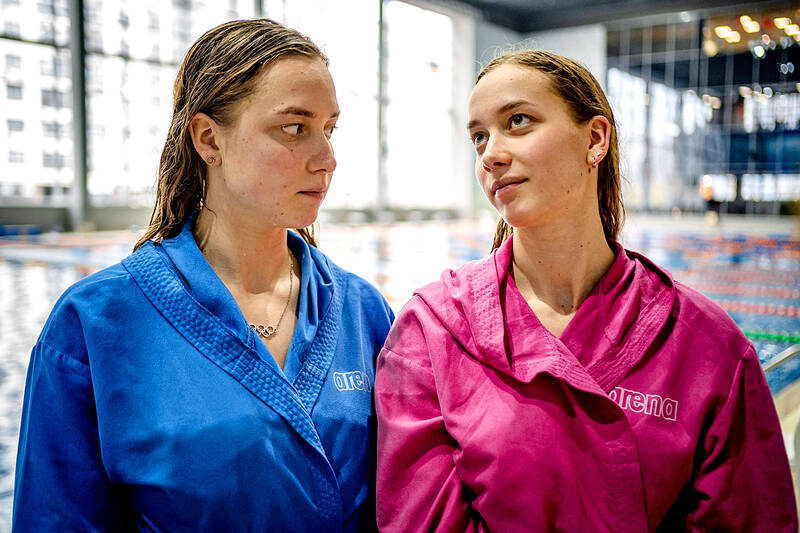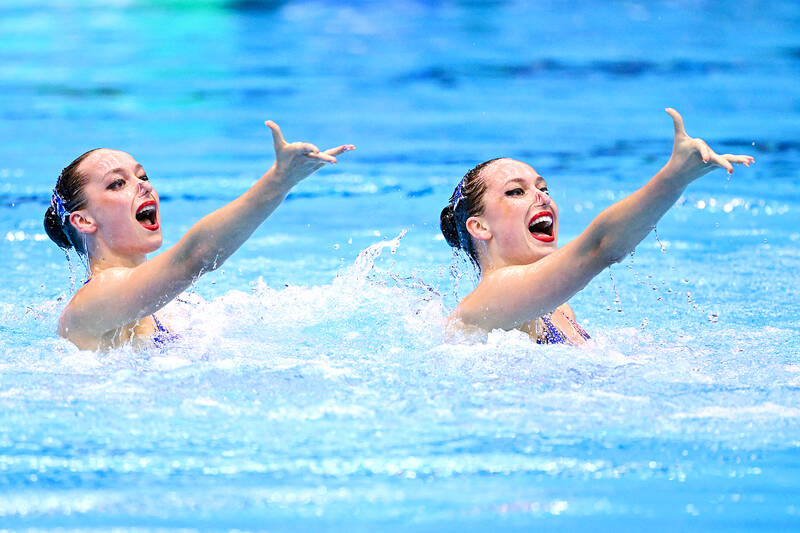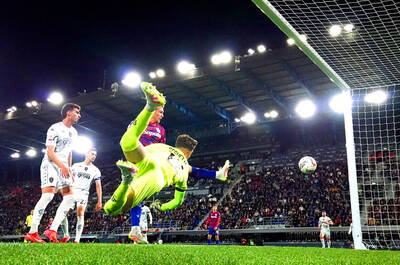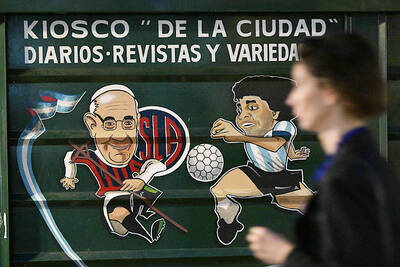As synchronized swimmers, Maryna and Vladyslava Aleksiiva are used to having to smile no matter what.
The sunny sisters are one of Ukraine’s best hopes of a gold medal at the Paris Olympics after winning a bronze in artistic swimming at the Tokyo Games three years ago.
However, the trials the 22-year-old twins have been put through — forced to flee their homes, surviving shelling and sleeping in bomb shelters — have tested even their stoicism.

Photo: AFP
They have even had to jump out of the pool and “run to the basement in wet swimsuits” when the explosions got too close, Maryna Aleksiiva said.
Russian tanks were stopped in the suburbs of their hometown Kharkiv during the invasion almost two years ago, with the sisters having to leave their sparkly costumes behind when they fled. Regular bombardments have not stopped them from returning to Kharkiv to prepare for the Games, even if the windows of their training pool are still broken from the missile attacks the border city is often subjected to.
“Everything has been bombed: our pool, where we started training, our school, our city center,” Maryna Aleksiiva said.

Photo: AFP
While the Ukrainian army eventually pushed the Russian troops back, Kharkiv is still vulnerable, only 30km from the border. Last week, 11 people were killed in the latest wave of Russian missile attacks on the city.
It is not exactly the ideal environment for elite swimmers to go for gold, especially when there is no generator to warm the water when the power fails, as it often did last year after the country’s electricity grid took a pounding from the Russians.
“When the war started, we did not know what to do,” said Vladyslava Aleksiiva, the shyer of the two, who often lets her twin finish her sentences. “But then we understood our main goal could be to show courage all over the world in competitions.”
“To show Ukraine is still alive,” Maryna Aleksiiva added. “We must show strength.”
With the Russians threatening to take the city in the early days of the war, the sisters fled Kharkiv with the rest of Ukraine’s artistic swimming team and trained in Italy for six months.
However, they were determined to go back to Ukraine to be closer to their parents, training in Kyiv and “sleeping at night in the corridor of a bomb shelter” before returning to Kharkiv.
They have not left their home city — the heart of Ukraine’s artistic swimming scene — since then, except for short trips abroad to compete.
Even if it is more dangerous, “it’s much better to be together, [even] without electricity and music to train,” Vladyslava Aleksiiva said during a break in the World Aquatics Artistic Swimming World Cup in France in May last year, when they won the duet gold.
“I called mum yesterday, but it was an air raid alert and I was a little bit nervous,” Maryna Aleksiiva said at the time. “Mum and dad said: ‘Don’t worry, we’re fine.’ So we tried to keep calm and concentrate on our competition.”
In July at the World Aquatics Championships in Fukuoka, Japan, they struck an even more somber note.
“It is hard to focus when your country is at war and you are away from family,” Vladyslava Aleksiiva said. “We have friends who are sportsmen who died on the battlefield defending our country ... it is an awful time for us.”
Yet back on their sofa in Kharkiv on a rare day off in November, they did not turn a hair when the air raid siren sounded, even though Maryna Aleksiiva’s apartment is on the top floor and more exposed to shelling.
The sirens go off “five or six times every day” she said. “At night also. It’s normal.”
Every morning they read the news to see if it’s safe to train, only going to the bomb shelter when it is really dangerous.
Vladyslava Aleksiiva lives next door with her husband, which is handy because “we always swap clothes, handbags, jackets, shoes,” Maryna Aleksiiva said.
On their lazy Sunday morning off — the one day they do not have to train at 6:30am — the sisters wore jeans and jumpers and light makeup in contrast to the heavy warpaint they put on for performances.
Lying on a table nearby was Maryna Aleksiiva’s bronze Olympic medal from Tokyo. Her sister took hers with her when they fled to Italy because it was “the most dear to me.”
“I was sure that they would be stars,” said their childhood trainer, Maryna Krykunova, who first came across them when they were eight years old.
Even then they were tall and supple and naturally in sync for duets, she said.
With girls who are not siblings, “we have to spend a lot of time making them similar,” she said. “With Maryna and Vlada, they are already twins so it’s much better.”
The last qualifying rounds are at the world championships in Qatar next month, with the team building up for the European Aquatics Championships in Belgrade in June, a dress rehearsal for the Games the following month.
“This is the most important time in our lives,” Vladyslava Aleksiiva said, adding that they have to prepare in “unequal conditions” compared with their rivals.
“We’ve been training every day for seven hours and we have a goal ... to show the courage of our country to the whole world,” Vladyslava Aleksiiva said.
A medal in Paris would be the ultimate riposte to their Russian competitors who messaged them in the first days of the invasion telling them: “Don’t worry, we will save you ... it’s a safety operation.”
“You’re crazy,” Maryna Aleksiiva said she replied. “I invite you to Kharkiv and you will see how my home town is now ... everything has been bombed.”

Bologna on Thursday advanced past Empoli to reach their first Coppa Italia final in more than half a century. Thijs Dallinga’s 87th-minute header earned Bologna a 2-1 win and his side advanced 5-1 on aggregate. Giovanni Fabbian opened the scoring for Bologna with a header seven minutes in. Then Viktor Kovalenko equalized for Empoli in the 30th minute by turning in a rebound to finish off a counterattack. Bologna won the first leg 3-0. In the May 14 final in Rome, Bologna are to face AC Milan, who eliminated city rivals Inter 4-1 on aggregate following a 3-0 win on Wednesday. Bologna last reached the

If the Wild finally break through and win their first playoff series in a decade, Minnesota’s top line likely will be the reason. They were all over the Golden Knights through the first two games of their NHL Western Conference quarter-finals series, which was 1-1 going back to Minnesota for Game 3 today. The Wild tied the series with a 5-2 win on Tuesday. Matt Boldy had three goals and an assist in the first two games, while Kirill Kaprizov produced two goals and three assists. Joel Eriksson Ek, who centers the line, has yet to get on the scoresheet. “I think the biggest

From a commemorative jersey to a stadium in his name, Argentine soccer organizers are planning a slew of tributes to their late “Captain” Pope Francis, eulogized as the ultimate team player. Tributes to the Argentine pontiff, a lifelong lover of the game, who died on Monday at the age of 88, have been peppered with soccer metaphors in his homeland. “Francisco. What a player,” the Argentine Football Federation (AFA) said, describing the first pope from Latin America and the southern hemisphere as a generational talent who “never hogged the ball” and who showed the world “the importance of having an Argentine captain,

Noelvi Marte on Sunday had seven RBIs and hit his first career grand slam with a drive off infielder Jorge Mateo, while Austin Wynn had a career-high six RBIs as the Cincinnati Reds scored their most runs in 26 years in a 24-2 rout of the Baltimore Orioles. Marte finished with five hits, including his eighth-inning homer off Mateo. Wynn hit a three-run homer in the ninth off catcher Gary Sanchez. Cincinnati scored its most runs since a 24-12 win against the Colorado Rockies on May 19, 1999, and finished with 25 hits. Baltimore allowed its most runs since a 30-3 loss to